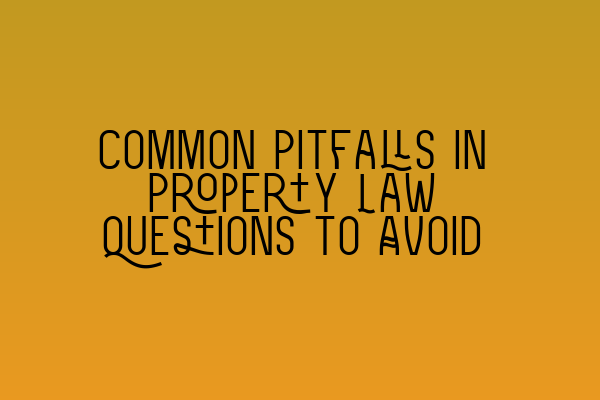Common Pitfalls in Property Law Questions to Avoid
When it comes to property law, there are numerous potential pitfalls that can trip up even the most experienced legal professionals. Whether you’re studying for the SQE exams or practicing in the field, it’s crucial to be aware of these common missteps and know how to navigate around them. In this blog post, we’ll explore some of the key pitfalls in property law questions and provide you with valuable insights to help you avoid them.
1. Failing to understand the legal framework:
One of the most fundamental mistakes in property law is not having a solid grasp of the legal framework that underpins it. Property law is governed by a complex web of statutes, regulations, and case law, and it is essential to have a comprehensive understanding of these sources of law. Without a firm foundation in the legal principles and rules, you may struggle to analyze and answer property law questions accurately. Be sure to devote ample time to studying the relevant legislation and precedent in order to avoid this pitfall.
2. Misinterpreting key terms and concepts:
Another common pitfall is misunderstanding or misinterpreting key terms and concepts in property law. This can stem from a lack of clarity around legal definitions or failing to apply the law correctly to a specific factual scenario. For instance, terms like “tenancy in common,” “easement,” and “adverse possession” can be particularly tricky to navigate. Take the time to thoroughly familiarize yourself with these terms and their nuances, and practice applying them to real-life scenarios. By honing your understanding of the key concepts, you’ll be better equipped to handle property law questions effectively.
3. Overlooking formalities and procedural requirements:
Property law is notorious for its adherence to formalities and strict procedural requirements. Failure to comply with these formalities can lead to serious consequences, including the invalidation of important property transactions. When answering property law questions, make sure you pay careful attention to procedural prerequisites such as the need for written agreements, registration of interests, and compliance with statutory notice requirements. By demonstrating a sound understanding of these formalities, you’ll avoid stumbling into this common pitfall.
4. Neglecting to consider equitable principles:
Property law is a blend of legal and equitable principles. Equitable rights and remedies can significantly impact the outcome of property law questions, yet they are often overlooked. It is crucial to recognize when equity comes into play and understand how it interacts with the legal aspects of property law. Whether it involves issues of undue influence, unconscionable conduct, or proprietary estoppel, taking the time to consider equitable principles will ensure you tackle property law questions comprehensively.
5. Failing to analyze the question thoroughly:
One of the biggest mistakes that property law students and practitioners make is rushing to answer a question without fully analyzing it. Property law questions can often be convoluted and layered, requiring careful deconstruction and consideration of the facts presented. Take the time to identify the issues, assess the relevant legal principles, and apply them to the specific scenario. By thoroughly analyzing the question, you’ll avoid making careless errors and demonstrate a deep understanding of property law.
Avoiding these common pitfalls in property law questions is crucial for success in your studies and in legal practice. By developing a solid foundation in the legal framework, honing your understanding of key terms and concepts, respecting formalities, considering equitable principles, and thoroughly analyzing questions, you’ll be well-equipped to tackle property law questions with confidence and accuracy.
For further practice and preparation for your SQE exams, be sure to check out our related articles and resources:
– SQE 1 Practice Exam Questions
– SQE 1 Practice Mocks FLK1 FLK2
– SQE 2 Preparation Courses
– SQE 1 Preparation Courses
– SRA SQE Exam Dates
Remember, practice makes perfect, and in the complex world of property law, it is essential to be well-prepared and knowledgeable. Good luck with your studies and future endeavors in property law!
